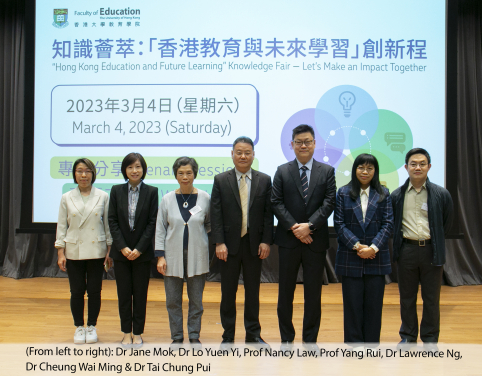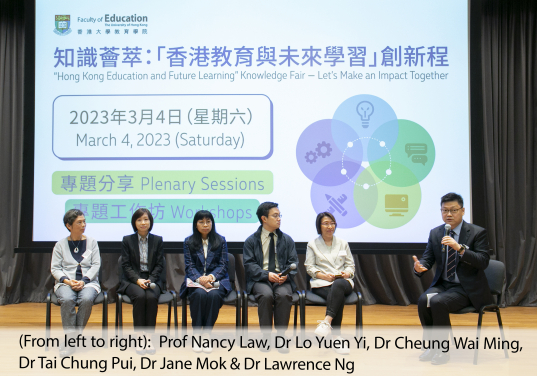Media
HKU Faculty of Education organises “Hong Kong Education and Future Learning” Knowledge Fair – Let’s Make an Impact Together to share research implications
04 Mar 2023
“Hong Kong Education and Future Learning” Knowledge Fair – Let’s Make an Impact Together, organised by The Faculty of Education of The University of Hong Kong (HKU), was held today (March 4). The event aimed to share the Faculty teachers’ research outcomes with the school sector and stakeholders to plan for future learning together.
The event started with the opening remarks made by Professor Yang Rui, Dean of the Faculty. He reiterated that a globally-acclaimed faculty of education also needs to be locally committed. “While great significance is attached to local engagement, we, as an integral Faculty of HKU, will never weasel out of our social obligations. We hope to be a vital nexus between global theory and local practice, aiming at both theoretical breakthroughs and practical significance, as demonstrated by today’s activities. Believing that teachers and principals are also researchers and policymakers, we are keen to work closely with local schools to make a difference,” said Professor Yang.
Plenary sessions and some interactive workshops were conducted in the whole-day event, featuring four themes including English and Chinese language learning (as 1st and 2nd language), organisational learning for innovation, and digital literacy. In the morning plenary sessions, teachers from the Faculty shared the theoretical bases and key findings of educational research that have significant implications for student learning and well-being, school development, parenting practices and parental education, and policy implementation and evaluation. The respondents in each session provided additional insights into the themes based on their work and personal experiences.
The plenary sessions started with Dr Lo Yuen Yi, Associate Dean (Learning & Teaching), and Associate Professor, Academic Unit of Teacher Education and Learning Leadership (TELL), Faculty of Education, HKU on the theme of “Enhancing the Effectiveness of English Medium Instruction (EMI) with Language Across the Curriculum (LAC)”.
Dr Lo pointed out that the medium of instruction (MOI) used to teach and learn content subjects is not only a long-lasting debate in Hong Kong, but also in other contexts like Europe and the Asia-Pacific region. However, students often encounter difficulty when mastering content knowledge and English simultaneously. As HKU researchers have been conducting school-based empirical studies on how to support teachers and students when using English as the MOI, Dr Lo shared their findings regarding LAC, which can be manifested through teachers’ cross-curricular collaboration and content and language integrated pedagogy. She also introduced different cross-curricular collaboration models, a pedagogical framework, and strategies to facilitate teachers’ professional development and pedagogy to effectively scaffold student learning. Some key findings are as follows:
1. To enhance the effectiveness of teaching and learning in EMI, LAC could be implemented through cross-curricular collaboration and content and language integrated pedagogy;
2. Cross-curricular collaboration could be manifested in three complementary dimensions: formal collaboration, informal collaboration and co-curricular activities; and
3. EMI teachers’ professional development could be promoted with a holistic model of intensive workshops, on-site school support, school-based LAC and a professional learning community.
After Dr Lo’s talk on MOI, two Faculty teachers, Dr Cheung Wai Ming, Unit Head, Academic Unit of Social Contexts and Policies of Education (SCAPE), and Director, Centre for Advancement of Chinese Language Education and Research (CACLER), and Dr Tai Chung Pui, Assistant Professor, Academic Unit of SCAPE, and Member of Management Committee, CACLER, continued with a language-learning related session entitled “Culturally Responsive Strategies to Enhance Chinese Language Learning (as 1st and 2nd language)”.
Dr Cheung and Dr Tai shared their research findings about Hong Kong teachers’ culturally responsive teaching self-efficacy. Among the five domains, “efficacy to accommodate diversity” is the most important. In order to enhance it, Dr Cheung and Dr Tai introduced the culturally responsive teaching strategies developed with collaborating schools over the years, which enabled students to spread their wings and soar in their Chinese learning. Some key findings are as follows:
1. Teachers performed the weakest in their “efficacy to be aware of cultural differences”; and
2. Teachers performed the strongest in their “efficacy to create a positive and trusting relationship with multicultural students”.
In addition to biliteracy and trilingualism, organisational learning was also a hot topic covered in the plenary sessions. Dr Jane Mok, Assistant Director, Centre for Information Technology in Education (CITE) of the Faculty, gave a talk on the theme ‘How to Design Appropriate “Architecture for Learning” to Promote Organisational Learning to Scale Education Innovations?’.
Dr Mok presented that CITE has been supporting local secondary and primary schools to implement different educational innovations, by walking with them during the change process and witnessing their development trajectories. Dr Mok’s research team found that a multilevel leadership team comprising teachers, middle managers and school administrators, and learning conditions created to facilitate innovation-focused learning at multiple levels are crucial to the sustainability and scalability of the innovations. Dr Mok also shared the principles for designing organisational learning and the implications of this multilevel connected learning model for the future development of Hong Kong education. The key findings of Dr Mok’s research are as follows:
1. Having a multilevel leadership team, e.g. comprising teachers, middle managers and school administrators, is crucial to the sustainability and scalability of educational innovations;
2. Learning conditions need to be created to facilitate innovation-focused learning at multiple levels, to enhance the innovation teams’ professional capacity when implementing changes; and
3. Important considerations for the design of the innovation-focused organisational learning, i.e. “Architecture for Learning”, include the organisational structure, interaction mechanism, agency of the multilevel innovation team and effective feedback and communication channels.
As information literary and e-learning are essential topics in education, Professor Nancy Law, Associate Dean (Research), Professor, Academic Unit of TELL, and Deputy Director, CITE of the Faculty, discussed on the theme of “What Insights Have Digital Citizenship and Digital Literacy Research Brought to Post-Pandemic School and Family Education?” in the last plenary session.
Professor Law stated that HKU researchers conducted four cycles of research on the digital competence of primary and secondary school students in Hong Kong from 2019 to 2022 and the factors affecting them. The following key findings are shared:
1. The research revealed serious and increasing digital competence divides within and across schools over time;
2. Digital competence contributes positively to online learning and protects against online risks, such as Internet addiction and cyberbullying experiences. New modes of social interactions and transactions, such as blockchain and metaverse, and rapid developments in artificial intelligence and big data (as found in powerful applications such as ChatGPT) bring new demands on the digital competence of citizens; and
3. Home resources, digital parenting, school culture, and e-learning leadership are significant factors in influencing digital citizenship development.
Based on their findings, Professor Law discussed what families, schools, policymakers, and the concerned public could do to address these widening divides.
Following the plenary sessions, participants enthusiastically responded to the presentations and raised questions to the speakers in the panel discussion moderated by Dr Lawrence Ng, Associate Dean (Outreach and Engagement) of the Faculty.
Mr Wong Kwan Ho, Prefect of Studies and Head of LAC at TWGHs Mrs Wu York Yu Memorial College, echoed the effectiveness of LAC in promoting teachers’ professional development and student learning. He shared the development of the school’s LAC practices, with reference to the HKU research team’s findings and frameworks.
Ms Wong Fai Mei, Principal of Baptist Lui Ming Choi Primary School, expressed that culturally responsive strategies are a mirror for teachers to reflect on how to utilise Chinese culture and multinational cultures as learning materials. Teachers should also make good use of community resources for better cultural understanding so as to make learning Chinese a win-win situation.
Mr Tsang Chi Cheong, Principal of Jordan Valley St. Joseph’s Catholic Primary School, shared his experience of applying the multilevel connected learning model in different schools, stressing that engaging the innovation team in inquiry and making their learning visible are crucial to the success of the education innovation.
Sr Anita Kwok Ming Yin, Principal of Daughters of Mary Help of Christians Siu Ming Catholic Secondary School, commented that the longitudinal data has helped inform developing a five-year school development plan embracing blended learning and positive education.
While the Faculty of Education would continue to reach out to stakeholders, the speakers expressed that schools, school councils, school-sponsoring bodies, professional associations, parent associations, non-government organisations and government departments are most welcome to contact them regarding continuous professional development opportunities that could meet their needs, future collaboration in research and publication, as well as continuous dialogue with them so that they could all make an impact on student learning and quality education.
In addition to the Plenary Sessions, five practical workshops are to be conducted in the afternoon. Details are as follows:
Framework and Strategies for Planning LAC
Speaker: Dr Lo Yuen Yi, Associate Dean (Learning & Teaching), and Associate Professor, Academic Unit of TELL, Faculty of Education, HKU
Teaching Mathematics Through the Medium of English
Speaker: Dr Arthur Lee, Lecturer, Academic Unit of TELL, Faculty of Education, HKU
Co-creations as a Blessing in Uncertain Times – The Magic of Picture Book
Speakers:
Dr Cheung Wai Ming, Unit Head, Academic Unit of SCAPE, and Director, CACLER, Faculty of Education, HKU
Ms Elaine Wong, Project Manager, CACLER, Faculty of Education, HKU
Dr Stephanie Chan, Assistant Professor, Academic Unit of CDIS, Faculty of Education, HKU
How to Design Appropriate “Architecture for Learning” to Promote Organisational Learning to Scale Education Innovations?
Speakers:
Dr Jane Mok, Assistant Director, CITE, Faculty of Education, HKU
Ms Cheng Cheuk Sze, Vice Principal, SKH Yuen Chen Maun Chen Jubilee Primary School
Ms Fung Yuen Mee, Assistant Principal, North Point Methodist Primary School
How to Use Data in Digital Schools and Digital Literacy to Enhance Student Learning in Primary/Secondary Schools?
Speakers:
Professor Nancy Law, Associate Dean (Research), Professor, Academic Unit of TELL, and Deputy Director, CITE, Faculty of Education, HKU
Ms Law Siu Tung, Curriculum Leader, Shanghai Alumni Primary School
Mr Ho Ying Hon, Principal, Caritas Fanling Chan Chun Ha Secondary School
Sr Anita Kwok Ming Ying, Principal, Daughters of Mary Help of Christians Siu Ming Catholic Secondary School
To view the e-version of this press release, download related photos and presentation files, please visit http://web.edu.hku.hk/press.
For media enquiries, please contact Ms Emily Cheung, Senior Manager (Development and Communications), Faculty of Education, HKU (Tel: 3917 4270 / Email: emchy@hku.hk).


